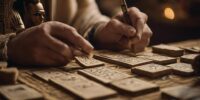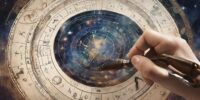When Tarot Cards Became More Than Just a Game
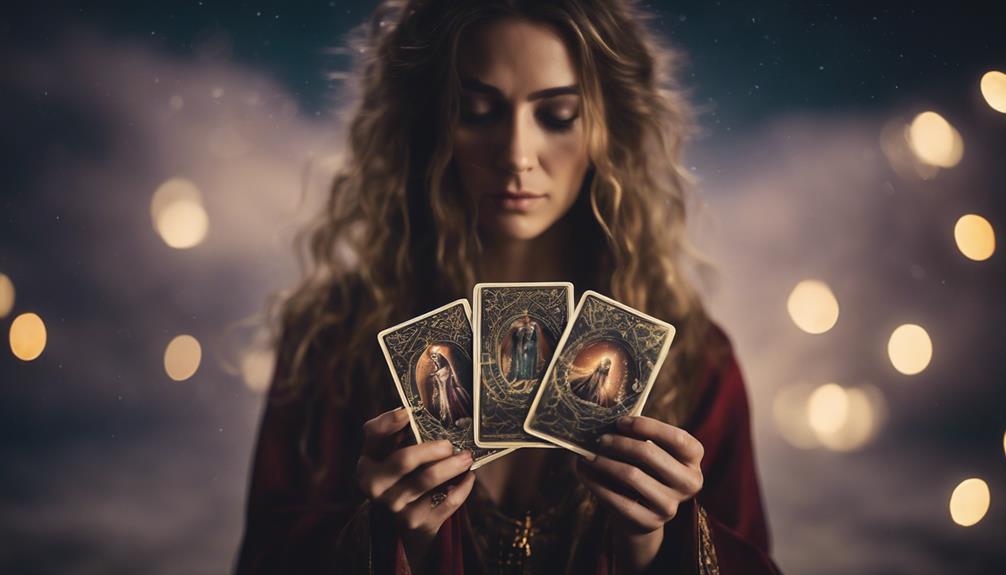
Tarot cards have a rich history that dates back to the mid-15th century in Europe. Initially used as playing cards for games, these decks evolved over time to become a powerful tool for spiritual guidance and self-reflection. The images and symbols on each card are thought to hold deep meaning and can be interpreted in various ways depending on the context of a reading.
Over the centuries, tarot cards have been associated with mystical practices, divination, and even occultism. Today, many people use tarot cards as a way to gain insight into their lives, seek clarity on important decisions, or connect with their intuition. The practice of reading tarot cards has become a popular form of self-care and personal growth, with each card offering a unique perspective or message to the reader.
While the origins of tarot cards may have been humble, their transformation into a spiritual tool highlights the enduring power and significance of these ancient cards. From their roots as playing cards to their current role as a means of spiritual exploration, tarot cards continue to fascinate and inspire people around the world.
Origins of Tarot Cards
The origins of Tarot cards date back to the 15th century in Europe, where they were first used as playing cards before evolving into a tool for divination and self-reflection. Initially, Tarot decks were adorned with symbolic imagery that conveyed various aspects of life, ranging from love to war, reflecting the human experience in multifaceted ways. These symbolic representations held deep meaning, inviting individuals to explore the mysteries of existence and investigate into the subconscious domains of their minds.
Over time, Tarot cards gained historical significance as they underwent a profound change, shifting from mere entertainment to tools for introspection and spiritual guidance. The cards began to be viewed as mirrors reflecting the innermost thoughts and emotions of individuals, offering a pathway to understanding oneself on a deeper level. This shift marked a pivotal moment in the evolution of Tarot, elevating its status from a simple game to a profound instrument for self-discovery and personal growth.
Cultural Shifts in Tarot Usage
Throughout history, the use of tarot cards has evolved from mere fortune-telling to a tool for deeper introspection and spiritual guidance.
In modern times, tarot cards are increasingly utilized in therapy sessions as a means of facilitating self-reflection and exploring subconscious thoughts and emotions.
This cultural shift highlights the versatility and adaptability of tarot cards beyond their traditional divinatory purposes.
Tarot for Guidance
Amidst societal changes, Tarot cards have increasingly become sought after for guidance, reflecting the evolving cultural attitudes towards spirituality and self-reflection.
In this modern era of spiritual awakening, individuals are turning to Tarot not just as a divination tool but as a source of inner wisdom.
The shift towards seeking guidance from Tarot signifies a deeper desire for introspection and connection with the self.
People are drawn to the symbolic imagery and archetypes present in Tarot decks, finding resonance and meaning in the cards they draw.
As individuals navigate the complexities of life, Tarot offers a way to tap into intuition and explore the depths of their subconscious, encouraging personal growth and self-discovery.
Tarot in Therapy
Exploring the intersection of tarot and therapy reveals a growing trend in utilizing symbolic imagery for introspection and healing purposes. Tarot cards are increasingly being used in therapeutic settings to provide individuals with therapeutic benefits and healing insights. Here's how this cultural shift is manifesting:
- Self-Reflection: Tarot cards serve as a mirror for individuals to explore deep into their thoughts and emotions, promoting self-awareness and personal growth.
- Empowerment: Through interpreting the cards, individuals can gain a sense of empowerment and control over their lives, fostering resilience and confidence.
- Healing Rituals: Incorporating tarot into therapy sessions can create a sacred space for healing rituals, promoting emotional well-being and inner peace.
This shift signifies a holistic approach to healing that integrates spirituality and psychology seamlessly.
Influential Figures in Tarot History
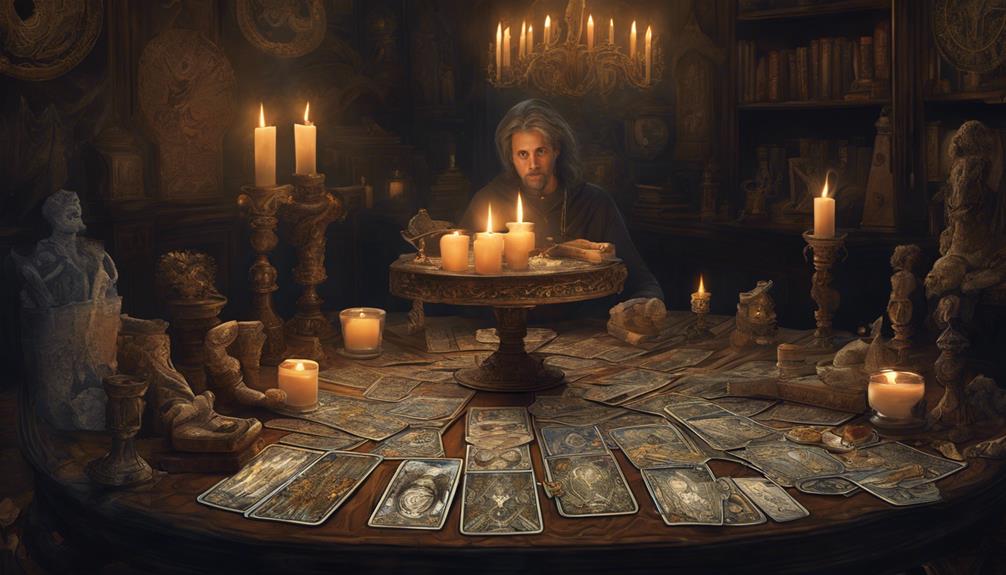
In the tapestry of Tarot history, certain individuals stand as pillars, their contributions shaping the evolution of this mystical practice. One of the most influential figures in Tarot history is Jean-Baptiste Alliette, better known as Etteilla. He was a French occultist in the 18th century who popularized the use of Tarot for divination purposes, giving birth to the practice as it's understood today. His work laid the foundation for the esoteric meanings assigned to each card, adding layers of depth and complexity to Tarot readings.
Another significant figure is Arthur Edward Waite, a prominent member of the Hermetic Order of the Golden Dawn. Waite, along with artist Pamela Colman Smith, created the Rider-Waite-Smith Tarot deck, which revolutionized Tarot symbolism and has become the most popular deck in the world. This deck's imagery and symbolism have had a lasting impact on Tarot readings and interpretations, solidifying Waite's place in Tarot history as a key influencer.
These figures, among others, have left an indelible mark on Tarot's historical significance, shaping its journey from a mere card game to a tool for introspection and divination.
Tarot's Connection to Spiritual Practices
Within the rich tapestry of Tarot history, the profound connection between Tarot and spiritual practices reveals a domain of deep introspection and insight. Tarot's roots plunge into spiritual growth, offering seekers a pathway to explore the depths of their inner selves. Through centuries, Tarot cards have been intertwined with divination practices, providing a mirror to reflect one's spiritual journey. The mystical connections found within Tarot's symbolism and archetypes serve as a gateway to reveal hidden truths and receive intuitive guidance.
- Personal Reflection: Tarot invites individuals to plunge on a journey of self-discovery, fostering spiritual growth and self-awareness.
- Connection to the Divine: Many believe that Tarot cards hold mystical connections to higher realms, allowing for spiritual insights and guidance to flow through readings.
- Intuitive Wisdom: Through Tarot, individuals can tap into their intuition, revealing a deeper understanding of their spiritual path and life's mysteries.
In embracing Tarot's spiritual essence, one opens the door to a domain where the unseen becomes visible, offering a beacon of light on the path to spiritual enlightenment.
Tarot's Evolution in Modern Times
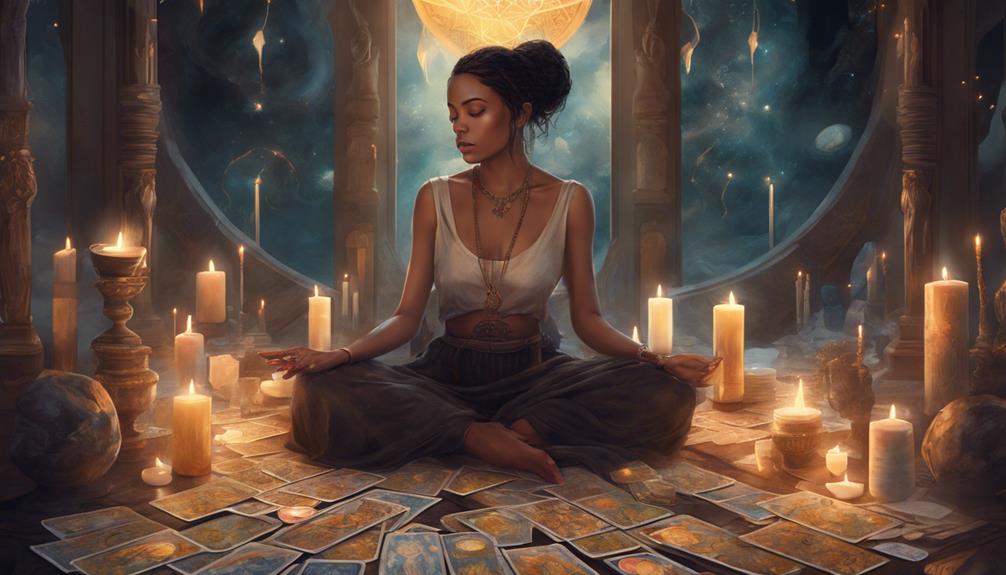
How has Tarot adapted and transformed in response to the demands of modern society and spirituality?
In modern times, Tarot has seen a significant evolution, with practitioners exploring new ways to interpret the cards and uncover their expanded meanings. While Tarot has a rich history rooted in divination and spiritual practices, contemporary readers have brought fresh perspectives to the ancient art.
Modern interpretations of Tarot cards often go beyond traditional fortune-telling, delving into psychological insights, personal growth, and self-reflection. Tarot decks now come in a variety of themes, catering to different interests and belief systems. This diversity allows individuals to find a deck that resonates with them personally, enhancing the connection between the reader and the cards.
Moreover, the meanings attributed to Tarot cards have expanded to encompass a wider range of experiences and emotions. As society continues to evolve, so too does Tarot, adapting to meet the needs of individuals seeking guidance, clarity, and spiritual fulfillment in the modern world.
Psychological Insights Through Tarot
Exploring the depths of the human psyche, Tarot cards offer profound psychological insights that illuminate the complexities of one's inner world. Through symbols and archetypes, Tarot becomes a tool for inner exploration, guiding individuals on an introspective journey towards self-discovery.
Here are three ways in which Tarot enhances emotional awareness and facilitates personal growth:
- Symbolic Reflection: Tarot cards act as mirrors, reflecting back the subconscious mind and bringing hidden thoughts and emotions to the surface. By engaging with these symbols, individuals can gain a deeper understanding of their innermost desires and fears.
- Intuitive Guidance: Tarot encourages individuals to tap into their intuition and trust their inner wisdom. This process fosters emotional awareness and helps in uncovering underlying patterns or beliefs that may be influencing one's present experiences.
- Empowerment Through Interpretation: By interpreting Tarot cards, individuals learn to trust their own judgment and insights. This empowerment leads to greater self-awareness and a heightened sense of agency in facing life's challenges.
Tarot's Impact on Personal Development
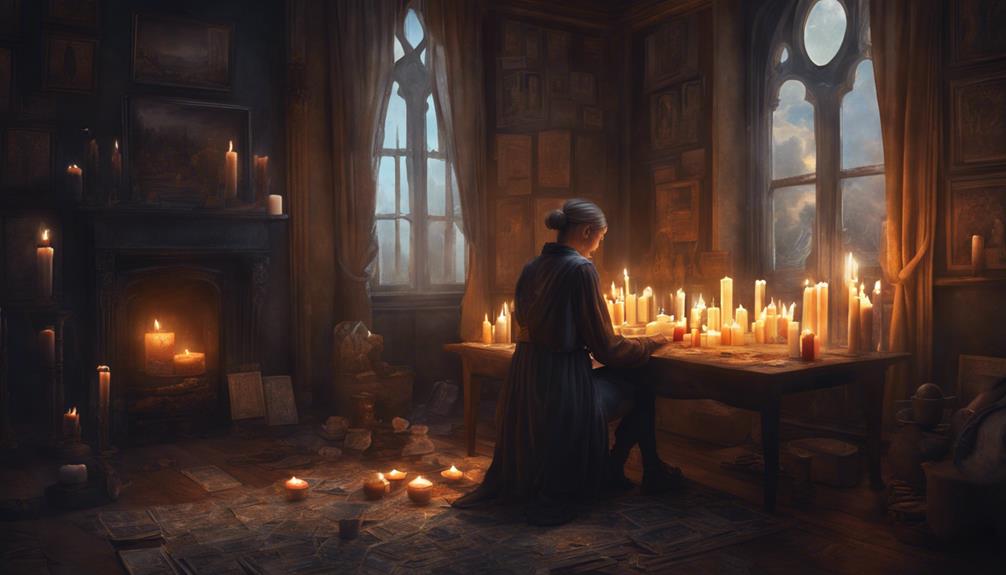
As individuals explore the depths of Tarot's symbolism and guidance, they discover a transformative journey towards personal development. Tarot cards hold a profound influence on personal growth, fostering spiritual awakening and guiding individuals towards inner transformation and self-discovery. The journey through Tarot is not merely about predicting the future; it serves as a mirror reflecting one's innermost thoughts, feelings, and desires, prompting deep introspection and self-awareness.
| Personal Growth | Spiritual Awakening |
|---|---|
| Inner Transformation | Self Discovery |
Through the process of interpreting Tarot cards, individuals confront aspects of themselves that may have been previously overlooked or suppressed. This confrontation catalyzes personal growth, leading to a heightened sense of self-awareness and empowerment. The journey through Tarot becomes a sacred ritual of self-discovery, revealing hidden truths and guiding individuals towards a more authentic and fulfilling existence. Embracing the wisdom embedded in Tarot's symbolism opens doors to a world of endless possibilities, inviting individuals to commence on a journey of self-realization and transformation.
Tarot's Enduring Popularity and Relevance
In today's fast-paced world, Tarot has found a place in modern culture as a tool for guidance and introspection. People are drawn to the psychological insights Tarot offers, providing a unique lens through which to explore their thoughts and emotions.
Whether used for self-reflection or seeking answers, Tarot's enduring popularity showcases its relevance in steering life's complexities.
Tarot in Modern Culture
The enduring popularity and relevance of Tarot cards in modern culture is a certification of their enduring mystique and power to provoke introspection. In today's society, Tarot has transcended its historical roots and continues to captivate people from all walks of life. Here are three reasons why Tarot remains a prevalent force in modern culture:
- Modern Interpretations: Tarot has evolved to encompass a wide range of interpretations, making it applicable to contemporary issues and personal growth.
- Dispelling Popular Misconceptions: Despite misconceptions, Tarot isn't solely about fortune-telling but serves as a tool for self-reflection and insight.
- Cultural Integration: Tarot has seamlessly integrated into art, literature, and popular media, cementing its status as a cultural phenomenon.
Psychological Insights From Tarot
Despite its historical origins, Tarot's enduring popularity in modern culture attests to its ability to offer profound psychological insights into the human mind and spirit.
The Tarot symbolism embedded within the cards taps into universal archetypal patterns that resonate with individuals on a deep level, providing a mirror to their innermost thoughts, feelings, and experiences.
Through the interpretation of these symbols and archetypes, individuals can gain valuable insights into their subconscious, allowing for personal growth, self-awareness, and reflection.
The rich imagery and diverse meanings within the Tarot deck offer a unique tool for exploring the complexities of the human psyche, making Tarot a powerful instrument for introspection and understanding in today's fast-paced world.
Tarot for Self-Reflection
With its enduring popularity and relevance, Tarot serves as a powerful tool for self-reflection, offering individuals a unique way to explore their inner thoughts and emotions. Through the use of Tarot cards, individuals set off on an introspective journey that can lead to profound self-discovery and personal growth.
- Symbolism: The rich symbolism in Tarot cards allows individuals to tap into their subconscious mind, uncovering hidden truths and emotions.
- Guidance: Tarot provides a framework for individuals to reflect on their current circumstances and gain insights into possible paths forward.
- Empowerment: By encouraging self-reflection, Tarot empowers individuals to take ownership of their thoughts, feelings, and actions, leading to a greater sense of self-awareness and fulfillment.
Frequently Asked Questions
How Do Tarot Cards Differ From Other Types of Divination Tools?
Tarot cards differ from other divination tools by their rich historical origins, which span centuries, and their deep cultural relevance across various societies. They offer unique insights and perspectives, making them a powerful and versatile tool for guidance.
What Is the Significance of the Imagery and Symbolism Found on Tarot Cards?
Symbolism interpretation of tarot cards offers a portal to the subconscious, opening hidden truths. Imagery exploration investigates into universal archetypes, reflecting human experiences. The cards serve as mirrors, guiding introspection and revealing paths to enlightenment.
Are There Specific Rituals or Practices Associated With Using Tarot Cards?
Tarot rituals and spiritual practices have evolved over time. They encompass various methods of shuffling, laying out cards, and interpreting meanings. These practices are deeply personal and can provide insight, guidance, and self-reflection.
Can Anyone Learn to Read Tarot Cards, or Is It a Skill That Requires Special Abilities?
Learning to read tarot cards is accessible to anyone. While some may have a natural talent, it is primarily a skill that improves with practice and dedication. Tarot misconceptions often overshadow the empowering and intuitive learning process.
Are There Any Controversies or Criticisms Surrounding the Use of Tarot Cards in Modern Times?
Controversies and criticisms swirl around tarot cards due to their controversial origins and modern misconceptions. Despite this, many appreciate the freedom tarot offers for personal reflection and insight, embracing its mystical allure.

